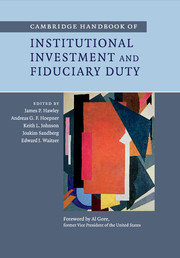Book contents
- Frontmatter
- Contents
- List of figures
- List of tables
- List of contributors
- Foreword
- 1 Introduction
- Part I Fiduciary duty: a global outlook
- Part II Fiduciary duty and the landscape of institutional investment
- Part III Challenging conventional wisdom on fiduciary duty
- Part IV Towards a broader interpretation of fiduciary duty
- 20 Fiduciary duty and the search for a shared conception of sustainable investment
- 21 Pension fund fiduciary duty and its impacts on sustainable investing
- 22 Reason, rationality and fiduciary duty
- 23 Socially responsible investment and the conceptual limits of fiduciary duty
- 24 Fiduciary duty at the intersection of business and society
- 25 Challenging conventional wisdom: the role of investment tools, investment beliefs and industry conventions in changing our interpretation of fiduciary duty
- Part V Beneficiaries’ roles and viewpoints
- Part VI Fiduciary duty and governance
- Index
- References
22 - Reason, rationality and fiduciary duty
Published online by Cambridge University Press: 05 April 2014
- Frontmatter
- Contents
- List of figures
- List of tables
- List of contributors
- Foreword
- 1 Introduction
- Part I Fiduciary duty: a global outlook
- Part II Fiduciary duty and the landscape of institutional investment
- Part III Challenging conventional wisdom on fiduciary duty
- Part IV Towards a broader interpretation of fiduciary duty
- 20 Fiduciary duty and the search for a shared conception of sustainable investment
- 21 Pension fund fiduciary duty and its impacts on sustainable investing
- 22 Reason, rationality and fiduciary duty
- 23 Socially responsible investment and the conceptual limits of fiduciary duty
- 24 Fiduciary duty at the intersection of business and society
- 25 Challenging conventional wisdom: the role of investment tools, investment beliefs and industry conventions in changing our interpretation of fiduciary duty
- Part V Beneficiaries’ roles and viewpoints
- Part VI Fiduciary duty and governance
- Index
- References
Summary
Introduction
The concept of fiduciary duty sits at the confluence of two powerful streams of Western intellectual thought, the legal and the economic: the legal because fiduciaries are managing the assets of others whose interests the law seeks to protect; the economic because fiduciaries assume the role of investors in the marketplace in managing these assets.
These legal and economic traditions pull fiduciaries in different and sometimes conflicting directions because their standards of appropriate behavior differ. Lawyers often use the standard of “reasonable” behavior, while economists frequently presuppose that people act “rationally.” Reasonable behavior, which finds notable expression in tort law, supposes that one takes into account the effect of one’s actions on others. The reasonable is by extension concerned with the protection or enhancement of a common good. Rational behavior, which is axiomatic to many neoclassical economists, is essentially self-interested and seeks to identify the most efficient means of achieving one’s personal ends. The rational is primarily concerned with the attainment of private goals.
- Type
- Chapter
- Information
- Publisher: Cambridge University PressPrint publication year: 2014
References
- 5
- Cited by



